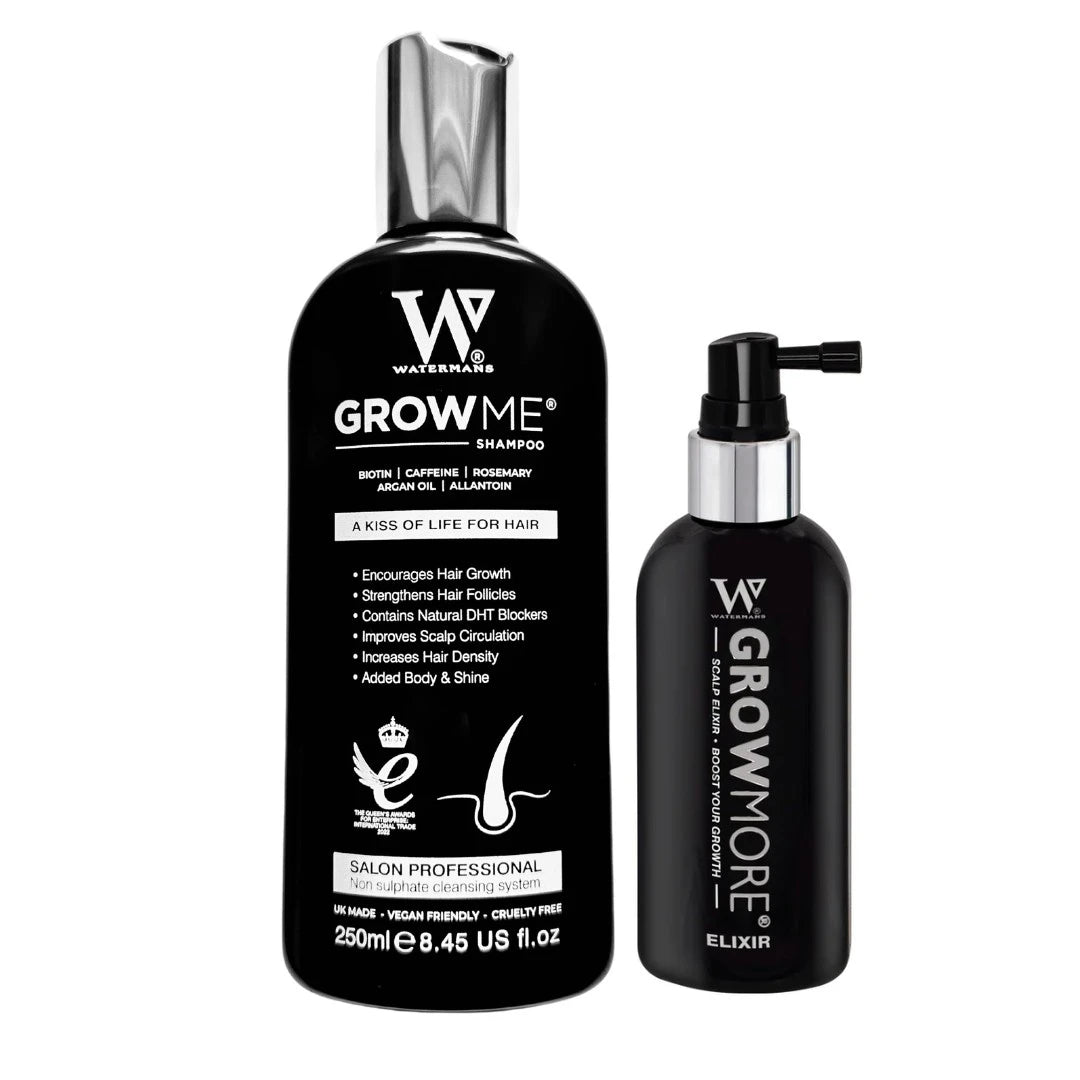
Regain Your Confidence: Effective Strategies to Combat Hair Loss After Surgery

Hair loss can feel very upsetting after surgery. Surgery can cause hair loss due to the anesthesia, stress from the procedure, or the body's own healing actions. Many wonder how to stop hair loss after an operation. Luckily, many ideas work well. In this article, we look at these ideas step by step.
If you face thinning or loss, Watermans Grow Me Shampoo is a good start. It mixes biotin, rosemary, caffeine, niacinamide, argan oil, allantoin, and lupin protein. This blend is known to wake the scalp and boost hair from the roots. Learn more about it here.
Why Surgery Causes Hair Loss
Know why hair falls after surgery. Many reasons lead to this:
-
Physical Stress
Surgery shocks the body. The stress puts hair follicles in a resting phase early, so hair falls. -
Anesthesia Effects
The anesthesia used in surgery can change how hair grows. Some people say hair thins after anesthesia, and experts are still studying this. -
Nutritional Needs
After your surgery, you may eat less or different foods. This change can cut out needed vitamins and minerals like iron, vitamin D, and B vitamins for strong hair. -
Hormonal Changes
Major surgery may shift your hormones. These shifts can change the normal hair growth cycle.
Knowing these points is the first step to stop hair loss after surgery.
Ways to Slow Hair Loss After Surgery
1. Good Food and Water
A diet rich in vitamins and minerals helps hair grow back thick.
-
Protein:
Hair is built from keratin protein. Eat protein from fish, poultry, beans, nuts, and dairy. -
Iron:
Not enough iron can make hair fall. Add foods like spinach, lentils, red meat, and fortified cereals. -
Zinc:
Zinc helps hair grow. Pumpkin seeds, chickpeas, and oysters deliver zinc. -
Water:
Drinking enough water moves nutrients to your hair roots.
2. Scalp Attention
Taking care of your scalp helps hair grow.
-
Light Massage:
A gentle massage sends blood to the hair roots. Use coconut or almond oil as you massage. -
Good Oil Drops:
Mix a few drops of rosemary or lavender oil with a base oil. Rub this lightly into your scalp to help the hair.
3. Pick Good Hair Products
Choose hair care products that support the scalp and hair. A mild shampoo and conditioner help care for your scalp.
Watermans Grow Me Shampoo is one to try. It mixes natural parts like biotin and saw palmetto. Many say this mix helps hair thicken and wake up the scalp. Find out more here.
4. Avoid Tight Styles and Harsh Chemicals
Protect your hair as you heal:
-
Loose Styles:
Skip tight ponytails and braids that pull on your hair. -
Less Heat:
Use heat styling tools like blow dryers less often. This avoids more damage. -
No Harsh Chemicals:
Do not use strong dyes or chemical treatments. These can make hair weak.
5. Ask Experts
If hair loss goes on, talk with a doctor. A skin expert can suggest ways and treatments that match your needs. They may advise:
-
Minoxidil:
Some over-the-counter treatments like minoxidil help hair grow. -
Supplements:
Vitamins like biotin or collagen may add strength to your hair.
6. Cut Stress
Stress may make hair fall more. Use daily ways to drop your stress:
-
Exercise:
Physical activity helps lower stress and boosts blood flow to your head. -
Mindful Acts:
Try meditation, yoga, or deep breathing to calm yourself. -
Good Sleep:
Get plenty of sleep so your body can repair itself.
7. Try Natural Help
Natural methods also may help your hair after surgery. Here are two ideas:
-
Aloe Vera:
Aloe soothes the scalp and helps it feel better. -
Saw Palmetto:
Some say this can block a hormone that harms hair and may help hair grow back.
Did You Know?
-
Hair Growth Cycle:
Hair grows in cycles. It has a growth phase (anagen), a brief change phase (catagen), and a rest phase (telogen). These steps explain why hair loss can be temporary. -
Caffeine:
Caffeine may give hair roots a lift. Many hair products use it for this reason. -
Whole Health:
Caring for both your body and mind may help your hair grow back and improve your outlook. -
Important Vitamins:
Vitamins such as biotin, vitamin D, and omega-3 fats help build strong hair. -
Water Need:
Drink about 8 to 10 cups of water each day. This keeps you well and helps your hair too.
Q&A Section
Q1: Can I use hair growth products soon after surgery?
A: Ask your doctor first. It is wise to be safe when healing.
Q2: Does hair loss after surgery last long?
A: Often, hair loss lasts only a short time because of the body’s stress. Many see new hair with the right care.
Q3: How soon will I see new hair?
A: New growth varies by person. Many see changes within 3 to 6 months after surgery.
Q4: Should I take vitamins for hair growth?
A: Talk with a doctor. They can suggest vitamins that suit your needs.
Q5: How can I keep my scalp healthy after surgery?
A: Use mild shampoos, eat a balanced diet, and massage your scalp gently.
Q6: Can stress alone make hair fall out?
A: Yes, stress can make hair fall more during recovery.
Q7: Can poor sleep slow hair growth?
A: Yes, not enough sleep can affect your overall health and slow hair growth.
Q8: Does my hair care routine need a change after surgery?
A: Using gentle products and dropping harsh treatments can help your hair recover.
Q9: Is it normal to lose more hair than usual after surgery?
A: Yes, many see more hair fall when their body is stressed. It often gets better with time.
Q10: Can I dye my hair after surgery?
A: It is best to wait until you have healed fully before dyeing your hair.
Use these steps and tips to care for your hair as you heal. If you try a strong fix, check out Watermans Grow Me Shampoo. It is known by many and supports hair regrowth in a natural way. For more details, visit Watermans.













